Respite and renewal brought to you by religious communities
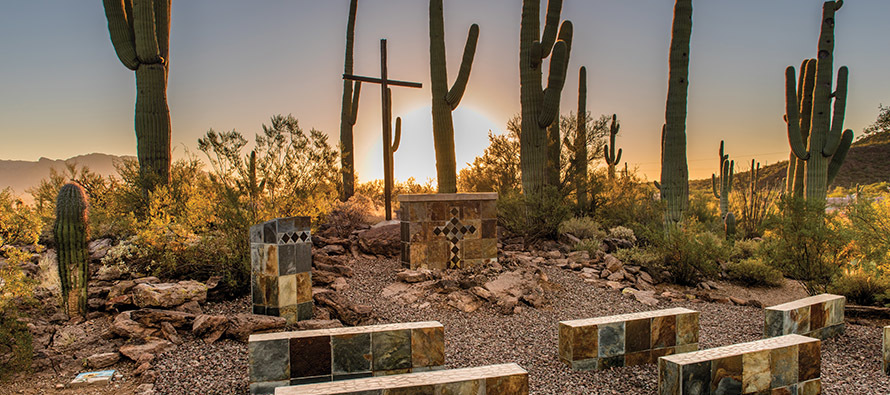
This outdoor chapel is on the grounds of the Redemptorist Renewal Center near Tucson, Arizona. (Photo courtesy of Redemptorist Renewal Center)
ONE OF THE GREAT GIFTS that religious communities have given to people of faith is retreat centers. In the United States alone, nearly 400 Catholic retreat centers exist, the great majority of them founded and run by religious institutes. Some are guest houses located on the grounds of a monastery; others are tucked away in the suburbs or countryside, most of these with ample natural areas for contemplative walks and hikes. A handful are even in the heart of cities, giving urbanites easy access to the prayer, spiritual development, and refreshment that a retreat can provide.
It is natural that communities of sisters, brothers, and priests would develop retreat centers for laity because the tradition of retreats is in the DNA of religious life. Religious institutes trace their beginnings to the Desert Fathers and Mothers, small groupings of third-century Christians who fled cities to live simple lives of prayer in the Egyptian desert. The Desert Fathers and Mothers were themselves following Jesus’ example of withdrawing to the wilderness to pray alone.
As religious life grew and evolved over the centuries, the concept of taking an annual retreat arose and took hold, sometimes right from the beginning, as with Franciscans. “Saint Francis would take time away from the larger community, but sometimes with one or two friars to spend time in reflective prayer, often in remote places,” says Brother Robert Roddy, O.F.M.Conv., director of the Franciscan Retreat and Spirituality Center in Prior Lake, Minnesota. Today most men and women religious take an annual retreat, usually for a week.
Modern retreat centers serve a number of purposes. They provide a prayerful, contemplative setting—and often access to a spiritual director—for individual prayer and reflection. Many offer structured group retreats that combine presentations with discussion, liturgy, ritual, and quiet time. It is also common for retreat facilities to invite groups such as parishes, Newman centers, or confirmation classes to rent space to put on their own programs.
During the COVID-19 pandemic, retreat centers around the world adjusted. Depending on local conditions and health regulations, some have been able to offer on-site retreats with social distancing rules in place, giving sanctuary to those seeking solace during a stressful time. Many retreat centers moved online, providing the faithful with dozens of options for virtual retreats, prayer times, and presentations, some of them specifically addressing the search for God during the disruption of the virus.
From the Atlantic to the Pacific, Catholic retreat centers span the globe, quietly offering time and space for rest, refreshment, and renewal. On these pages is a sampling of how religious institutes are continuing this long tradition.
Related article: VocationNetwork.org, “Divine design: The holiness of place.”
Find the divine in the desert
Some retreat centers are located on properties with such distinctive natural beauty that the setting itself is a big part of what makes retreats special. This is true for the Redemptorist Renewal Center in the Sonoran Desert of Arizona, just outside of Tucson (pictured in the opening photo above). Its sprawling 120 acres are next to the Saguaro National Park, in the foothills of the Tucson Mountains. The area was a sacred space some 1,500 years ago for the Hohokam people whose holy images (petroglyphs) remain on boulders on the property. The Redemptorist priests founded the center in 1964 at the request of the local bishop and continue to guide it as part of their evangelization and hospitality ministry. In addition to offering private retreats and an array of themed retreats, this center also offers a four-week program for becoming a spiritual director and a 10-week sabbatical program that draws priests and religious from around the world. The center’s assistant director, Peter Tran, reports that many retreatants say this verse, written on the church wall, describes their experience: “The desert will lead you to your heart where I will speak” (Hosea 2:14).
Website: Desertrenewal.org
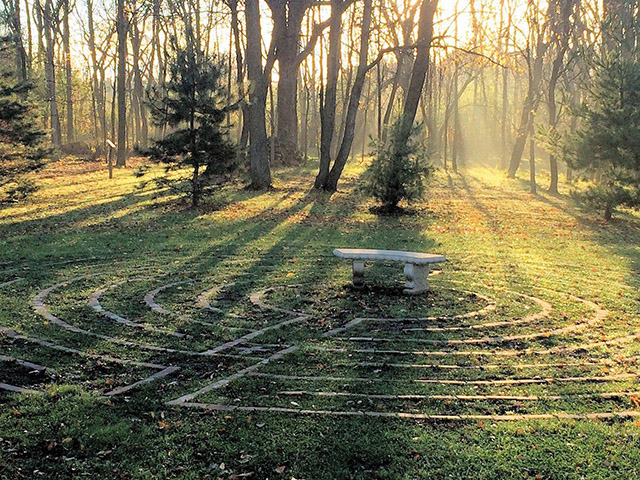
Minnesota retreat center with Franciscan flair
The Franciscan Retreat and Spirituality Center in the Twin Cities area of Minnesota is one of more than a dozen Franciscan-run retreat centers around the country. Serving some 2,000 people a year, the center offers a wide range of programs, with regular offerings specifically for men, women, and those seeking time out during Advent or Lent. “Our retreats attempt to address contemporary issues through the use of sacred scripture, our Franciscan resources, music, art and ritual,” says director Brother Robert Roddy, O.F.M.Conv. Retreatants will also encounter a Franciscan flavor, he says, in the surrounding 60 acres of woods and trails and in the way retreats are led in collaboration with laywomen ministers. The friars founded the center in 1966, responding to a demand among area Catholics for a retreat house in the southern end of the Twin Cities region.
Website: Franciscanretreats.net
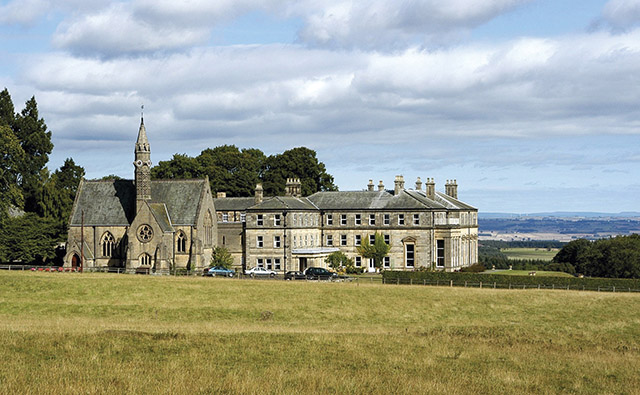
Healing hospitality in northern Britain
In a large rural area in northeast England lies Minsteracres Retreat Centre, situated on 110 acres of woods, fields, and gardens. A newer enterprise compared to many retreat centers, Minsteracres was established in 2012 and grew out of the ministries of the local Passionist priests and brothers, whose residence is located on the property, along with St. Elizabeth Catholic Parish.
“The resident Passionist community are effectively the ‘soul’ of the retreat center and provide a continuous presence of hospitality and prayerfulness,” says operations manager Geoffrey Bockett.
Retreat programs include explorations of Passionist spirituality, the liturgical year, scripture, and more. This retreat center puts a special emphasis on environmental stewardship in its care for the land and in programs such as “walking retreats” that foster appreciation for the natural world. Minsteracres also prioritizes retreats for “people on the margins of church and society.” Working with partner organizations, it has hosted retreats for refugees, disabled children, those affected by substance abuse, and survivors of torture. Some 6,000 people a year typically pass through Minsteracres.
Website: Minsteracres.org
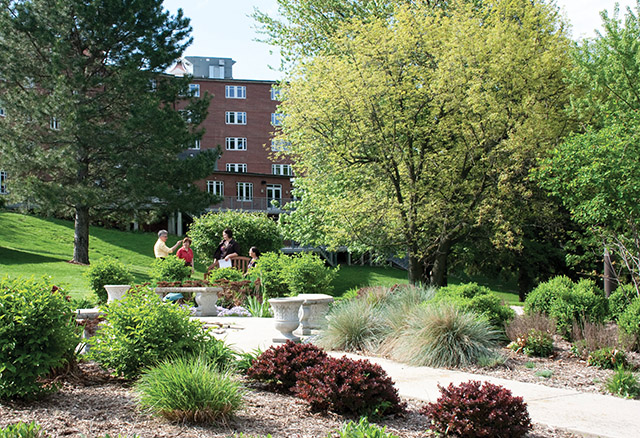
A place for the spiritually curious
Located on the ample grounds of the motherhouse of the Adrian Dominican Sisters, the Weber Retreat and Conference Center is located in the small Michigan town of Adrian, about an hour’s drive from Detroit. Established in 1970, the sisters see the center as an extension of the Dominican emphasis on the search for truth. With more than 14,000 visitors a year, this busy retreat and conference center offers many opportunities for spiritual growth and renewal: monthly days of mindfulness; Holy Week, Advent, and summer retreats; and presentations on scripture, theology, and social justice issues. Visitors can also arrange for private retreats with or without spiritual direction. One unique feature of the center is the adjacent INAI: A Space Apart, an art gallery with spaces for art workshops and quiet reflection.
Website: Webercenter.org
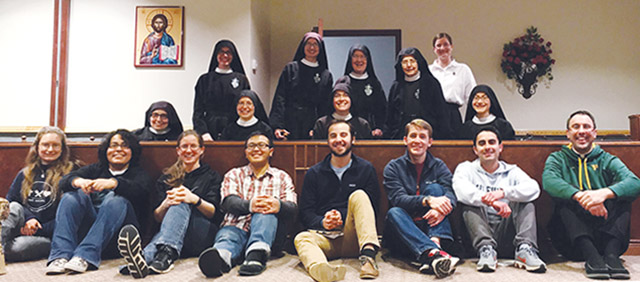
A taste of contemplation in the Kentucky woods
The St. Joseph Retreat House near Whitesville, Kentucky offers visitors a chance to taste contemplative life. This small facility, which serves approximately 375 people a year, is essentially an extension of the monastic community of the Passionist Nuns of St. Joseph Monastery who live on the same grounds. Established in the 1940s, St. Joseph’s follows a centuries-long tradition of monasteries that have added rooms or buildings specifically to encourage people to enter their world for prayerful time away from daily pressures. The 175 acres of woodlands and trails surrounding this retreat house also provide space for reflection and contemplation.
The sisters don’t organize or give retreats (groups are encouraged to bring their own leaders), nor do they provide spiritual direction (their priest chaplain is available for this), but rather they provide the setting and spiritual ambience for individuals and groups. Because this religious community prays the Divine Office, visitors have several opportunities each day to pray or attend Mass with them and absorb their devotion to Christ’s Passion.
Website: Passionistnuns.org/retreat-house
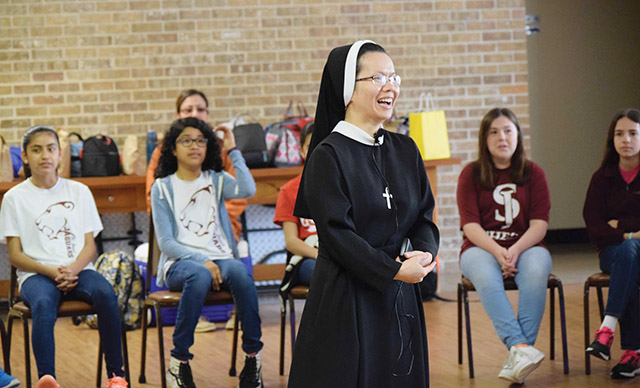
A warm family welcome for Texas retreatants
When the Sisters of the Holy Family of Nazareth opened the Nazareth Retreat Center in 2009, they strategically chose a spot between Fort Worth and Dallas because people in the region had no easy access to a retreat house. Today it offers a wide range of themed group, private, and directed retreats. In keeping with the sister’s emphasis on family life renewal, prospective retreatants can go online to “build their own retreat,” with options including “family faith sharing and renewal,” “building up family strengths,” “engaged couple retreat,” and “Catholic blueprint for a loving marriage.” The goal of the retreat center, says Sister Francesca Witkowska, C.S.F.N., its mission and ministry director, is “to create a sense of ‘coming home’ for each retreatant through deep listening and responding to Christ’s presence among us.”
Website: Nazarethretreats.org
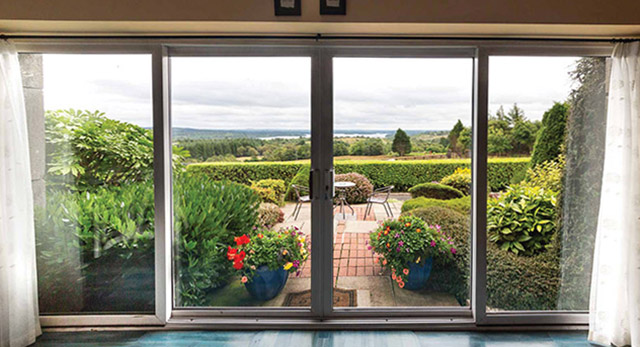
Daytime oasis in the Irish countryside
When the Mercy Sisters founded Galilee Spirituality Centre in 2001 in the Irish countryside, they saw it more as a place for spiritual development than for overnight retreats. It does have two rooms for overnight visitors, but its emphasis is on day programs for up to 35 people, offered in a peaceful countryside environment that promotes prayer and faith formation. Both are priorities for the congregation. To that end, the center invites the public in for regularly scheduled morning and evening prayer, mindfulness meditation, reflection on the Sunday readings, and Taizé prayer. Professional ministers regularly gather at the center for group reflection. Other times groups develop programs working with the center’s staff, which includes three Mercy sisters. The center’s “quiet garden” is a draw for those who want to experience God in nature. Care for creation is another priority for the Mercy Sisters, and it factors into programs such as an annual climate conference.
Website: Galilee.ie
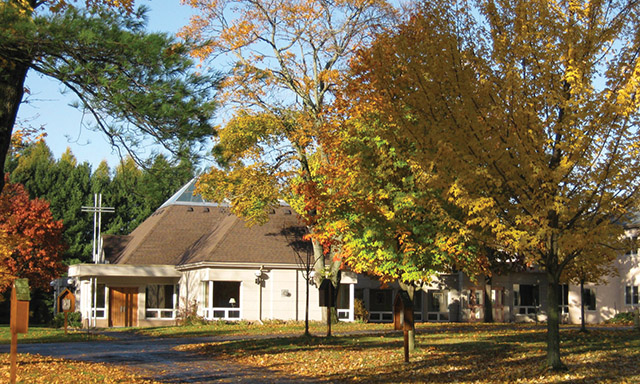
Insight and inspiration on the edge of the city
Manresa Spiritual Renewal Centre in the Toronto metro region is one of more than 30 retreat centers that the Jesuits sponsor across North America. The Jesuits have a long tradition of retreats, dating back to the 1500s when they began encouraging prayerful time away from one’s normal routine as a path for spiritual development. Manresa is best known for offering weekend retreats on a wide variety of themes, such as “Knowing myself as a child of God,” a retreat for men, and “Let’s start at the very beginning,” an overview of church development. Manresa also offers frequent retreats for members of Alcoholics Anonymous and Al-Anon. Retreatants have an opportunity to converse with a spiritual director and, if desired, to take part in the sacrament of Reconciliation. In addition to themed-retreats, the center welcomes individual private retreats and groups that want to host a program at its 21-acre setting, located next to a conservation area with trails. “I came here to be renewed by God,” wrote one retreatant. “I left with a newfound zeal, touched and inspired by Him.”
Website: Manresa-canada.ca
Tags
Related
- Literature makes good people better
- Icons: An age-old entrée into the divine
- Religious communities have deep and diverse roots
- Scientific wonder is God’s handiwork
- Lives that lead to God: Biographies and memoirs
- Religious orders aid and advocate for migrants
- Rural religious take to the highways and byways
- Divine design: The holiness of place
- More prayer spaces of religious communities
- Word as witness to the Word Read More
Most Viewed
- Find your spirituality type quiz
- Questions and answers about religious vocations
- Celibacy quiz: Could I be a nun? Could I be a brother? Could I be a priest?
- Resources for older discerners or those with physical and developmental differences
- About Vocation Network and VISION Guide


